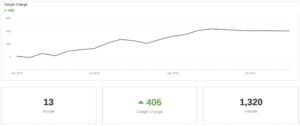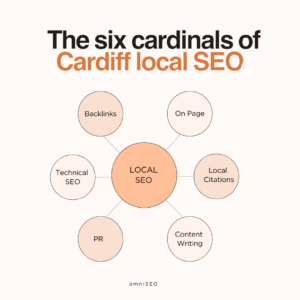The Role of Content Marketing in Cardiff’s SEO Landscape
Cardiff’s digital scene is buzzing, and like elsewhere, businesses are in a rush to grab attention online. From tech startups in Cardiff Bay to cosy cafés in Pontcanna, standing out in search results is a must for businesses across South Wales.
Content marketing is one of the most reliable weapons for boosting SEO, helping businesses climb Google rankings while winning over local customers.
Today we’re having a quick look at why content marketing is a game-changer for Cardiff’s SEO landscape, how to craft content that clicks with the city’s vibrant market, and practical ways to make it part of your SEO strategy. By nailing local relevance and search intent, businesses can drive traffic, build trust, and cement their place in Cardiff’s business environment.
But if this is all new to you, you might be a little confused at why this is so important.
Let’s start at the beginning:
Why Content Marketing Matters for SEO in Cardiff

Content marketing is about creating valuable, relevant material—blog posts, videos, guides—that draws in and engages an audience. For SEO, it’s a cornerstone because search engines like Google favour websites with fresh, high-quality content. Content marketing offers a way to reach local customers and shine in a packed digital space.
Google’s algorithms reward content that answers user queries, matches search intent, and delivers a solid user experience. For example, if you run a Cardiff bakery business, posting a blog titled “Best Vegan Cakes in Cardiff” could potentially rank your site for local searches related to that question, reliably pulling in nearby customers. Content on local topics, when done right, also attracts backlinks from local sites, like WalesOnline or community blogs, which lift your own website’s authority for Cardiff related searches. Plus, engaging content keeps visitors on your site longer, signalling to Google that your pages deserve a high rank.
In the local business market, content marketing bridges global SEO tactics with local needs. The city’s residents, like most tightknit communities, look for authenticity and community. This means that content reflecting the cities culture can foster trust and loyalty. By mixing local charm with SEO best practices, businesses can capture both search engine and customer attention, making the most out of their local area as a sub-niche all of it’s own.
Crafting Cardiff-Focused Content for SEO

Creating content that ranks well and resonates with Cardiff audiences demands a clear strategy. Here are the key elements to focus on:
1. Target Local Keywords

Keyword research is, like with most SEO related tasks, where it starts. Use tools like Google Keyword Planner, ahrefs or SEMrush to pinpoint terms local residents search for, especially terms that are looking specifically for businesses in the area, like “Cardiff web design” or “best restaurants in Cardiff.” Long-tail keywords, such as “affordable family activities in Cardiff,” often face less competition and convert better.
Weaving these keywords naturally into titles, headings, and body text is a good way to ensure your content indexes well in search engines. Overloading with keywords looks spammy and hurts rankings, so keep it balanced and relevant. A gym in the area could easily slip “Cardiff fitness classes” into a blog about workout trends, ensuring the term fits smoothly and without being forced.
2. Create Locally Relevant Content

Cardiff’s identity—its history, neighbourhoods, and events—is a goldmine for content. Blog posts like “What’s On in Cardiff This Weekend” or “A Guide to Cardiff’s Independent Shops” tap into local pride and draw readers. For instance, a retailer could publish a piece on “Shopping in St David’s vs. Mermaid Quay,” comparing two hotspots in a way that is helpful to local shoppers while also subtly showcasing their own products.
Event-based content is another winner. Writing about Cardiff’s Food and Drink Festival or Winter Wonderland pulls in timely traffic in large numbers, including from visitors from other cities. Include practical details, like dates and locations, to meet searchers’ needs. Adding photos of Cardiff landmarks or local events makes content visually engaging and shareable on social media, boosting its reach.
3. Match Search Intent

Content must deliver what users want. Google sorts search intent into different categories. For example keywords can be informational, meaning they’re looking to learn specific information (“history of Cardiff Castle”), navigational, meaning they’re trying to navigate to a specific website or page (“Cardiff Council waste collections”), and transactional, meaning they’re looking to make a purchase (e.g., “buy concert tickets Cardiff”). An event planner might create a blog for informational intent, like “How to Plan a Wedding in Cardiff,” while a retailer could target transactional intent with “Where to Buy Artisan Gifts in Cardiff.”
To hit the mark on search intent, check the top-ranking pages for your target keywords, since you may fail to achieve anything if your content is not what Google is looking to rank for that particular term. If someone searches “Cardiff yoga studios,” they likely want a list of options with details like class schedules and prices. A yoga studio’s blog could provide exactly that, formatted with clear headings and a map of Cardiff locations. However, trying to rank a page only talking about your own studio may fail even with an excessive amount of links, since that goes against the intent of the search term.
4. Optimise for Engagement

Engaging content keeps users on your site, cutting bounce rates and boosting SEO. Best practice is to use a friendly, natural but knowledgeable tone that feels like a chat with a local. Break up text with bullet points, images, and subheadings where relevant for easy reading. For example, an estate agent could write a guide on “Buying a Home in Cardiff” with separate sections on specific areas, complete with photos and price ranges.
It’s also good practice to try to spark interaction by ending posts with a call to action, like “Comment with your favourite Cardiff coffee shop!” or “Share this guide with a friend.” This lifts engagement metrics, which are weighed by Google when it is ranking pages.
Integrating Content Marketing into Your Cardiff SEO Strategy
Content marketing needs to slot into a wider SEO plan to shine. Here’s how Cardiff businesses can make it work:
1. Build a Content Calendar

Plan content around Cardiff’s seasonal trends. A post about “Cardiff Christmas Markets” in November or “Summer Activities in Bute Park” in July aligns with local searches and maximises your chances of getting decent traffic. Use a content calendar to schedule posts consistently—weekly blogs or monthly guides keep your site active, which Google loves.
2. Leverage Local Backlinks

Share your content with Cardiff-based groups, like local charities or business networks, to earn backlinks. A post about “Cardiff’s Best Charity Events” could be shared with local nonprofits, who might link back to your site. These backlinks signal authority to Google, lifting your rankings.
3. Promote on Social Media

Cardiff locals are active on platforms like Instagram and Facebook. Share your content there with relevant local hashtags like #CardiffLife or #CardiffEvents. A florist could post a blog link about “Wedding Flowers in Cardiff” on Instagram, tagging venues like Cardiff Castle to reach engaged couples.
4. Track and Refine

Use Google Analytics and Search Console to track how your content performs. Check which posts drive traffic and which keywords rank highest. If a post about “Cardiff coworking spaces” gets lots of clicks, create related content like “Best Cafés for Remote Work in Cardiff.” If a post of yours has ranked well but not as high as you’d like, consider buying some backlinks from a Cardiff SEO agency. This data-driven approach keeps your content relevant.
Examples of how to Use Content Marketing in Cardiff

Cardiff businesses are already using content marketing to boost SEO, but there are always new ideas worth trying. Imagine a Canton restaurant posting a blog on “Cardiff’s Hidden Food Gems,” mentioning nearby spots while also linking to their menu. Sneaky and effective! This pulls in foodies searching for dining options and earns shares from local food bloggers.
This type of strategies shows how content can be practical, helpful, and still promotional. By focusing on what Cardiff residents care about—community, culture, and convenience—businesses create content that ranks well and builds lasting connections.
Challenges and Solutions
Content marketing has its challenges. Time constraints and lack of expertise can slow progress. Hiring a Cardiff-based SEO agency, like OmniSEO, can bridge the gap. These guys know the local market, do this full time and can craft content that hits home. For those on a tight budget, free tools like AnswerThePublic can also spark ideas for blog topics based on Cardiff-related searches.
Staying consistent is another hurdle. Irregular posting can dent SEO, so stick to a manageable schedule, like one blog post a month, one per week if possible, etc. Quality beats quantity—Google prefers one well-researched post over several rushed ones.
As we’ve hopefully illustrated, content marketing is a powerful tool for Cardiff businesses aiming to climb Google’s rankings and connect with locals. By targeting local keywords, creating relevant content, and matching search intent, businesses can drive traffic and build trust. Weaving content into a broader SEO strategy—through calendars, backlinks, and social promotion—maximises impact. In a city as lively as ours, content that captures its spirit while solving real problems is the key to SEO success.
Start small, stay consistent, and watch your online presence soar.
Want help with this? We offer free game plans for local businesses. Just click through to this form to get yours and start growing your Cardiff business online, or use our contact page if you have any questions.
Good luck!

